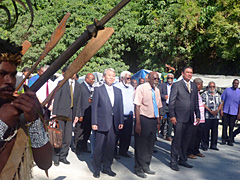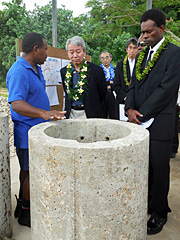
JICA President Akihiko Tanaka, center, attends the Official Launching Ceremony for the Port Vila Lapetasi International Multi-Purpose Wharf Development Project.
JICA President Akihiko Tanaka visited Vanuatu in the Pacific region from May 4 to 6.
During his stay, he attended the Official Launching Ceremony for the Port Vila Lapetasi International Multi-Purpose Wharf Development Project, Japan's first loan assistance project in the country, along with Prime Minister Moana Carcasses Kalosil. He also visited the sites of JICA projects in the country.
On the morning of May 5, Tanaka paid courtesy calls on Carcasses and Acting Minister of Foreign Affairs Bob Loughman (Education minister), respectively, and they exchanged opinions on the Vanuatu government's initiatives toward solving various problems and on future prospects.
On May 5, Tanaka participated in wharf launch ceremony. Vanuatu is the fourth country in the Pacific region to receive ODA loan assistance. With Ni-Vanuatu wearing traditional clothing leading the way, he walked into the venue. The project will expand the Lapetasi wharf, located adjacent to the main Port Villa wharf (improved by a Japanese grant aid in 2011) and used for domestic cargo, into a new international cargo only terminal. In his address at the ceremony, Tanaka emphasized the importance of the wharf, saying, "As an archipelago nation, Vanuatu is primarily dependent on maritime transportation to sustain its economy, and the Port Villa wharf is an international trade hub. This project contributes to the economic growth of Vanuatu."

JICA President Akihiko Tanaka, center, visits a Bouffa Landfill site.
Carcasses said that the international wharf's construction would smooth distribution and greatly contribute to tourism, Vanuatu's No. 1 industry, and he expressed deep gratitude to the Japanese government and JICA for carrying out the project. There is a great deal of interest in a project directly tied to the economic development of Vanuatu, and approximately 200 Cabinet ministers, donors and people involved in government attended the ceremony. And from Ifira Island, which is near the project construction site, the chief and villagers participated in the ceremony. They demonstrated traditional ceremonies of Melanesia such as kava ceremony, giving a warm welcome to the first visit by a JICA president to Vanuatu.
During the ceremony, Tanaka held a joint news conference with Carcasses.
"Japan's cooperation toward the Pacific region as a whole is being carried out with the idea that Japan wants to strengthen its relationship with the Pacific island countries, which share the precious world public good of the Pacific Ocean, as important partners that work with the international community. Japan will provide cooperation using its knowledge and technology as a leading nation in environmental conservation, disaster risk reduction and management, technology and human resource development, including the dispatching of volunteers, to the following four areas in which Japan has comparative advantage: environmental conservation and management, climate change and disaster management, infrastructure development, and improvement of social service," Tanaka said.
Then an active question and answer session relating to cooperation to the Pacific region and Vanuatu was held, with Carcasses, Tanaka and members of Vanuatu media participating, and it was covered by newspapers, television and radio the next day, impressing upon Vanuatu the significance of Japan.
The same day, Tanaka visited the construction site of the Project for the Redevelopment of Vila Central Hospital, a grant aid project. Vila Central Hospital is one of five national hospitals in Vanuatu, and it is the top referral (1) medical facility that accepts serious cases from all around the country. However, its deterioration has advanced because it has not been renovated much since its opening in 1974, and it is unable to efficiently offer services because its facilities are dispersed. The project aims to improve medical services by centralizing functions, leaving inpatient facilities and the diagnostic department in existing facilities and moving the outpatient and emergency department and the surgery, examination and radiation departments to new facilities.
In front of the nearly complete facilities, Tanaka heard an explanation from those executing the building contract, and observed the facilities and installed equipment of the emergency department, the general outpatient department, the radiation department, the examination department and the surgery department one by one. During the visit, Tanaka, along with stakeholders from the Ministry of Health and the hospital, discussed the current situation at the hospital and the importance of its role as the top referral hospital in Vanuatu, whose population is growing by 2.6 percent per year.
On May 6, Tanaka paid a courtesy visit to Mayor Sumptoh Ulrich of Port Villa Municipality Council, a local government of Vanuatu, and he exchanged information with council personnel regarding waste management initiatives being deployed in the Pacific region by JICA since 2000, including reducing the amount of waste and improving disposal. In presentations by Council personnel, they said the urban garbage problem is worsening due to an increasing population, urbanization and a growing tourism industry. They expressed appreciation for JICA's cooperation and their hope for continued assistance regarding the waste management program in the city of Port Vila.
In response to this, Tanaka said that as an island nation like Vanuatu modernizes and urbanizes and various external materials come into the country, appropriate waste disposal is an important issue, and he wants to proactively tackle the problem as a priority issue for the Pacific region.
Then Tanaka visited a Bouffa Landfill facility with a Semi-Aerobic Sanitary Landfill System (2), known as the Fukuoka system, along with counsel personnel and experts from the Promotion of Regional Initiative on Solid Waste Management in Pacific Island Countries (J-PRISM) project, being carried out as a region-wide project in Oceania.
Notes:
- 1 . A hospital that, as a higher-order medical facility with advanced medical capacity and technology, takes serious cases that secondary-order medical facilities such as regional clinics cannot examine and treat.
- 2 . The Semi-aerobic Sanitary Landfill System (the Fukuoka System) is a technique that was developed and made practical by the city of Fukuoka and Fukuoka University. It is currently being used as a landfill site preparation method in Japan, and through JICA's cooperation, it is being used in many developing countries.
Related Links
- Joint News Conference with Prime Minister Carcasses in Vanuatu (speech transcript)
- JICA’s activities in Vanuatu




scroll